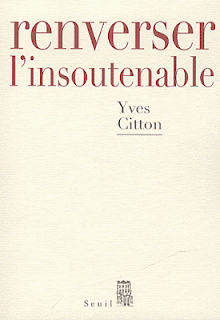The revival of interest in Simondon's term transindividuality to thematize social relations has raised the question of what a politics of transindividuality would mean, or what the very concept of transindividuality offers for politics. As Alberto Toscano argues, this question has as its basis the lack of any real political dimension to Simondon's thought. Despite this lack, or maybe because of it, much of the contemporary revival of Simondon in such thinkers as Stiegler, Virno, Balibar, and Citton, is political, or social-political in orientation. That last qualification is important, because it is my contention that what is at stake in Simondon's concept of transindividuality is not just a rethinking of "the political" (do we really need another?) but a rethinking of the relation between politics and economy.
Yves Citton makes this clear in his recent book Renverser l'insoutenable. The title of this book refers the intersecting "unbearables," an unsustainable relation to ecology, an untenable psychic situation, an unacceptable degradation of ethics, an indefensible political situation, and an untenable media situation. For Citton these five figures of the current conjuncture must be addressed, and addressed together through their intersections and contradictions. Such a sobering, or pessimistic account of the current conjuncture practically invites despair. How is it possible to address the complete destruction of our natural, social, and psychic environment (to borrow the three figuration of "ecology" developed by Guattari, which is a point of reference for Citton's five unbearable dimensions of the present) all at once?
Citton's response partly involves an interrogation of a certain kind of grand politics, a politics grounded on the the idea of a radical break, a heroic subject, and an anguish over the failures of each. This of course sounds like a caricature of Badiou, but Citton is less interested in the critique than in using the sketch to draw another concept of politics, or two, what he refers to as a politics of pressures and a politics of gestures. These politics are not the same, but they differ from the "grand politics" by functioning in terms of continuity rather than break and by the intersection of the collective and individual, rather than through and individual or collective subject.
With respect to the first, a politics of pressure, Citton's definition can be at least initially understood as an attempt to work out what is meant be "political pressure." As Citton argues it can only refer to a sustained and necessarily transindividual set of practices, ideas, affects, and relations that create and sustain pressure. Pressure is nothing other than a specific articulation of affects and ideas that constitute a given set of individuals and collectives. This understanding of pressure can be seen in its everyday use by pundits, politicians, and reporters, which refers to pressure as a set of beliefs, ideas, and affects that are both individuated in particular opinions, the stuff of opinion polls and “man on the street interviews,” and form the basis of particular groups. Citton, however, is less interested in defining this particular turn of the pundits phrase than he is in thinking through the other ways in which pressure manifests itself in society. Citton turns specifically to the capitalist relation as both a site of structured coercion, that of the wage relation, and, at least historically, as a site of counter pressures. The union and various forms of class struggle are all examples of pressure. Citton argues, in a manner which comes close to Tiqqun (whom he cites) that such struggles have been attenuated in contemporary society. Neoliberal society can be understood as an attenuation of the pressure inherent in the wage relation. This attenuation takes the route of extending the capitalist relation throughout all of society, obscuring the real conflict between capitalist and workers through a ubiquitous and toothless notion of competition, but most importantly it does so by internalizing the ideal of the individual as human capital and entrepreneur of oneself. Here, Citton follows a great deal of writings on neoliberalism, but most importantly Lordon's work, which identifies neoliberalism with as much a production of subjectivity, a creation of individuals as entrepreneurs of the self, driven by either scarcity or opportunity. This universe of competition is an attenuation of the actual conflict underlying capitalist society. The pressures which defined class struggle become diffused in a society that generalizes and atomizes competition.
Citton's second figure of politics is a politics of gestures. Gestures, like pressures, are necessarily transindividual, existing as both individual and collective. Citton draws from a variety of thinkers, such as Agamben who have examined gestures as that which pass between the most intimate and basic of subjectivity to its infinite mediations through film and mass media. Citton's ultimate reflection on gesture is mostly spinozist. The first axiom of a politics of gestures is that they are always conditioned, are gestures, ways of acting and inhabiting space, are always citations. The second axiom is that are gestures have effect precisely because they are conditioned. It is because we act in relation to other gestures that our gestures have any effects. As Citton argues, the combination of the mediated and modifying has revealed itself in the wave of protests from the Arab Spring to Occupy in the US. The gestures, from occupying squares to the often mocked hand gestures of the general assembly, were precisely what spread across the globe. Some would argue that this was all that spread, but Citton's point is that gestures and pressures, as much as decisions and declarations, constitute the basis of politics.
One could say that Citton's argument is not to ask whether transindividuality has a politics, but what would a politics look like from the fundamental rethinking of social relations through transindividuality. The focus would no longer be on that which constitutes the militant individual, but what constitutes the basis for transformed subjectivities.

No comments:
Post a Comment